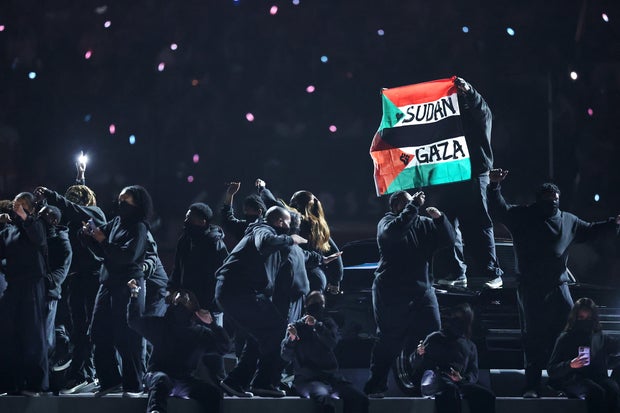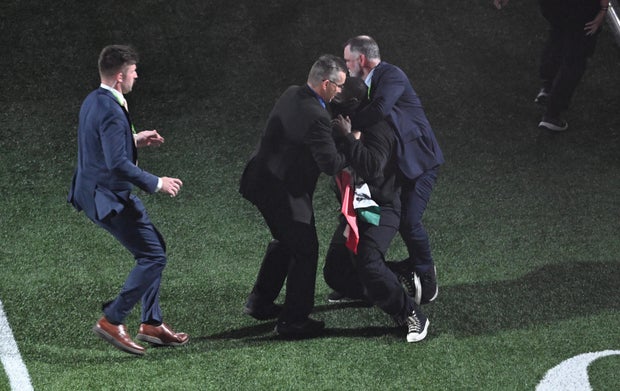A performer at Kendrick Lamar’s Super Bowl halftime show unfurled a flag emblazoned with the words Sudan and Gaza in a protest over the two wars roiling the Middle East.
Security personnel at the stadium detained the performer shortly after the flag was waved atop a car used as a prop in the performance. New Orleans police said were determining whether any charges would be lodged against the performer.
The NFL said the person would be banned for life from NFL stadiums and events. “We commend security for quickly detaining the individual who displayed the flag. He was a part of the 400-member field cast. The individual hid the item on his person and unveiled it late in the show. No one involved with the production was aware of the individual’s intent,” the league said.
The company behind the halftime show, Roc Nation, said the protest was “neither planned nor part of the production and was never in any rehearsal.”
So, what was this protest about, what’s happening in the Gaza Strip and Sudan – and how does it affect the wider world?
Here’s what’s going on in Gaza
The Gaza Strip is an enclave along the Mediterranean Sea bordered by both Egypt and Israel. It covers some 140 square mile — about the twice the size of Washington and 3-and-a-half times the size of Paris. But it’s incredibly densely populated and was home to 2.3 million Palestinians before the start of the 2023 Israel-Hamas war.
The war began when Hamas, a militant group that’s ruled Gaza since 2007, stormed across the border into Israel, killing some 1,200 people and taking 250 hostage. Israel responded with a devastating ground and air campaign across Gaza, killing more than 47,000 Palestinians, according to health authorities in the Hamas-run region, who do not differentiate between fighters and noncombatants in their count. Much of the territory has been left in ruins, and it’s unclear how it could be rebuilt.
A ceasefire began Jan. 19 and is still holding. Palestinian militants have freed hostages while Israel has released Palestinians held in prisons there. However, worries remains over whether the peace will hold. President Trump’s announcement of plans for the United States to “take over” the Gaza Strip also have upended discussions about the enclave’s future.
Famine has been mostly averted in Gaza as a surge of aid enters the territory during the fragile ceasefire, United Nations humanitarian chief Tom Fletcher says. But he warned the threat could return quickly if the truce collapses.
The Palestinians want the Gaza Strip and the West Bank for a future state of their own, with east Jerusalem as its capital. That long-sought, two-state solution for the decades-long conflict is backed by Mideast nations and much of the international community. Israel has expressed openness to the idea of resettling Gaza’s population, with Israeli Prime Minister Benjamin Netanyahu on Sunday calling it “a revolutionary, creative vision.” Hamas, the Palestinians and much of the world have rejected it.
Here’s the situation in Sudan
Sudan, a nation in northeastern Africa, has been unstable since a popular uprising forced the removal of longtime autocratic President Omar al-Bashir in 2019. A short-lived transition to democracy was derailed when army chief Gen. Abdel-Fattah Burhan and Gen. Mohammed Hamdan Dagalo of the paramilitary Rapid Support Forces led a military coup in 2021.
The RSF and Sudan’s military began fighting each other in 2023. Their conflict has killed more than 28,000 people, forced millions to flee their homes and left some families eating grass in a desperate attempt to survive as famine sweeps parts of the country. Other estimates suggest a far higher death toll in the civil war.
In recent weeks, Burhan’s forces, including Sudan’s military and allied militias, have advanced against the RSF. They retook a key refinery north of Khartoum, Sudan’s capital. They’ve also pushed in on RSF positions around Khartoum itself. The fighting has led to an increase in civilian casualties. From Jan. 31 until Feb. 5, the U.N.s’ Human Rights Office documented at least 275 civilian deaths from artillery, airstrikes and drone assaults.
“Indiscriminate attacks, as well as threats and attacks directed against civilians must cease immediately,” said Seif Magango, a spokesperson for the Human Rights Office. “The Sudanese Armed Forces and the Rapid Support Forces – and their allied movements and militias – must respect their international law obligations and take concrete steps to protect civilians from harm, including humanitarian workers and human rights defenders.”
Online, activists have sought to draw attention to both Gaza and Sudan, though the conflicts have different roots and participants. The idea of the two conflicts being linked by their devastation has been made by celebrities.
In August, American rapper Macklemore said he canceled a concert in Dubai over the United Arab Emirates’ role “in the ongoing genocide and humanitarian crisis” in Sudan through its reported support of the paramilitary RSF. While the UAE repeatedly has denied arming the RSF, U.N. experts reported “credible” evidence last year showed that the Emirates sent weapons to the RSF several times a week from northern Chad.
Macklemore at the time said he reconsidered the show in part over his recent, public support of Palestinians over the Israel-Hamas war. He has been performing a song called “Hind’s Hall,” in honor of a young girl named Hind Rajab who was killed in Gaza in a shooting that Palestinians have blamed on Israeli forces opening fire on a civilian car.



